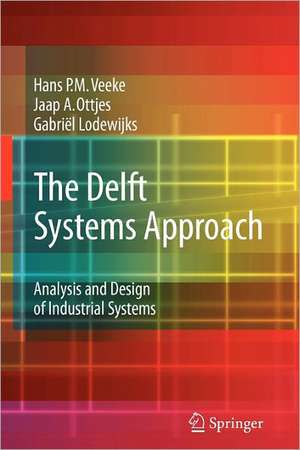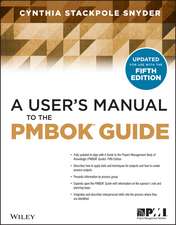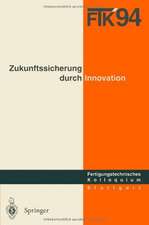The Delft Systems Approach: Analysis and Design of Industrial Systems
Autor Hans P. M. Veeke, Jaap A. Ottjes, Gabriel Lodewijksen Limba Engleză Paperback – 13 oct 2010
| Toate formatele și edițiile | Preț | Express |
|---|---|---|
| Paperback (1) | 941.68 lei 6-8 săpt. | |
| SPRINGER LONDON – 13 oct 2010 | 941.68 lei 6-8 săpt. | |
| Hardback (1) | 947.67 lei 6-8 săpt. | |
| SPRINGER LONDON – 6 iun 2008 | 947.67 lei 6-8 săpt. |
Preț: 941.68 lei
Preț vechi: 1148.40 lei
-18% Nou
Puncte Express: 1413
Preț estimativ în valută:
180.19€ • 188.64$ • 149.10£
180.19€ • 188.64$ • 149.10£
Carte tipărită la comandă
Livrare economică 05-19 aprilie
Preluare comenzi: 021 569.72.76
Specificații
ISBN-13: 9781849967457
ISBN-10: 1849967458
Pagini: 236
Ilustrații: XII, 223 p.
Dimensiuni: 155 x 235 x 12 mm
Greutate: 0.34 kg
Ediția:Softcover reprint of hardcover 1st ed. 2008
Editura: SPRINGER LONDON
Colecția Springer
Locul publicării:London, United Kingdom
ISBN-10: 1849967458
Pagini: 236
Ilustrații: XII, 223 p.
Dimensiuni: 155 x 235 x 12 mm
Greutate: 0.34 kg
Ediția:Softcover reprint of hardcover 1st ed. 2008
Editura: SPRINGER LONDON
Colecția Springer
Locul publicării:London, United Kingdom
Public țintă
Professional/practitionerCuprins
Systems Concepts.- Case: The Flight Department.- Models for the Structuring of Processes.- Conceptual Model for the Analysis of Industrial Systems.- Behaviour of a Function: The Process.- The Case of the Ship Engine Factory.- Policy and Performance.- Model for the Innovation Process.- The Design Process with the Conceptual Models.- Case: The Automated Container Terminal.
Notă biografică
Hans P.M. Veeke, Jaap A. Ottjes and Gabriël Lodewijks all work for the Delft University of Technology in The Netherlands.
Textul de pe ultima copertă
The pace of development in knowledge and know-how in the fields of organisational sciences, logistics and information technology is rapid. However, the gap between the researcher in these areas and the practicing manager is growing. The Delft Systems Approach sets out to close the gap between theory and practice, and to achieve the following goals:
- To improve the conception of a design in order to obtain a better match between expected and real operation of a (future) industrial system;
- To integrate the structural and behavioural concepts for a system to be designed;
- To support the communication between different specialists involved in the same processes and projects;
- To guide managers in applying this knowledge to the problems with which they are confronted in practice; and,
- To communicate knowledge and understanding of that part of systems theory which will enable managers to further improve their performance and/or to reduce their workload.
Caracteristici
Describes a fundamental approach for analysing industrial systems, which emphasizes a concept that can be used by all disciplines involved, and makes a logical systematic combination of quantitative and qualitative modelling Includes supplementary material: sn.pub/extras














